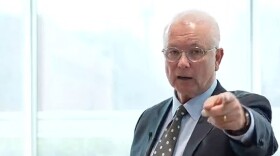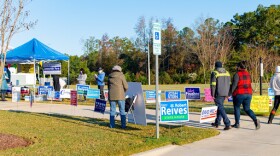Governor Roy Cooper said he would not exercise his veto power if the Republican-controlled General Assembly would just remove one part of its recently passed legislation on the makeup of the state elections board and ethics commission.
Cooper should just get his veto pen poised and not bother holding his breath.
The governor, a Democrat, told reporters Tuesday that he had no problem with the measure besides the part that deals with investigations into elections fraud and campaign finance violations.
The legislature drafted the measure after a court determined the current law governing the combined elections and ethics enforcement board is unconstitutional.
Republican legislators drew up the 2017 law combining elections and ethics and taking away some of the governor's appointment power shortly before Cooper took office.
The new legislation would return the stand-alone elections board to a five-member body consisting of gubernatorial appointees.
Governor Cooper said he objects to Part IV of the measure, which, in part, would keep elections fraud investigations confidential, require them to be started within a four-year timeframe, and limit the elections board's ability to pursue alleged campaign finance violations.
"At first blush, this legislation restores the board of elections to a constitutional structure," Cooper said, in response to a reporter's question about why the elections board bill received some bi-partisan support.
Cooper noted, however, the measure was pushed through the legislative process as a conference report, avoiding debate and amendments.
Moreover, the General Assembly's Republican leadership called the extra legislative session just before they lose their veto-proof majority starting in January.
"I think that there wasn't enough time to weigh the downside of Part IV versus passing this elections law that everybody had worked so hard to get in place," Cooper added. "And when you read it, when you consider it, when you talk to the people who deal in election fraud cases, you see the problems with it and how it can work to obscure investigations, take away the light that needs to shine on this and it can frustrate investigators and prosecutors."
A harsh Republican response was swift.
"Governor Cooper laid bare what he's sought for two years: partisan weaponization of the Board of Elections' (sic) investigatory power," according to a statement issued by Patrick Ryan, a spokesman for Senate President Pro Tem Phil Berger (R-Rockingham).
Ryan's statement pointed out that Andy Penry, a Democrat and Cooper appointee, recently stepped down as chairman of the elections board amid controversy over partisan comments he posted on Twitter.
"The legislature will not allow the Governor to use the partisan Board of Elections as a blunt instrument to hammer his political adversaries," Ryan's statement said.
"Governor Cooper's failure to act is holding the entire Board of Elections hostage, including the NC-9 investigation, in his effort to achieve unchecked power to launch corrupt and unfounded partisan attacks on legislators."
The board's current structure was designed by Republicans to dilute Cooper's authority. It remains in place by a court-ordered stay that was supported by GOP lawmakers while they worked on new legislation and while the elections board investigates possible vote tampering in North Carolina's 9th Congressional District.
An evidentiary hearing on January 11 will determine whether or not there should be a new election in the 9th, where Republican Mark Harris leads Democrat Dan McCready by 905 votes in uncertified results.
The investigation centers on alleged improprieties with more than 1,500 absentee ballots, many of them handled by a campaign operative hired by the Harris campaign.







